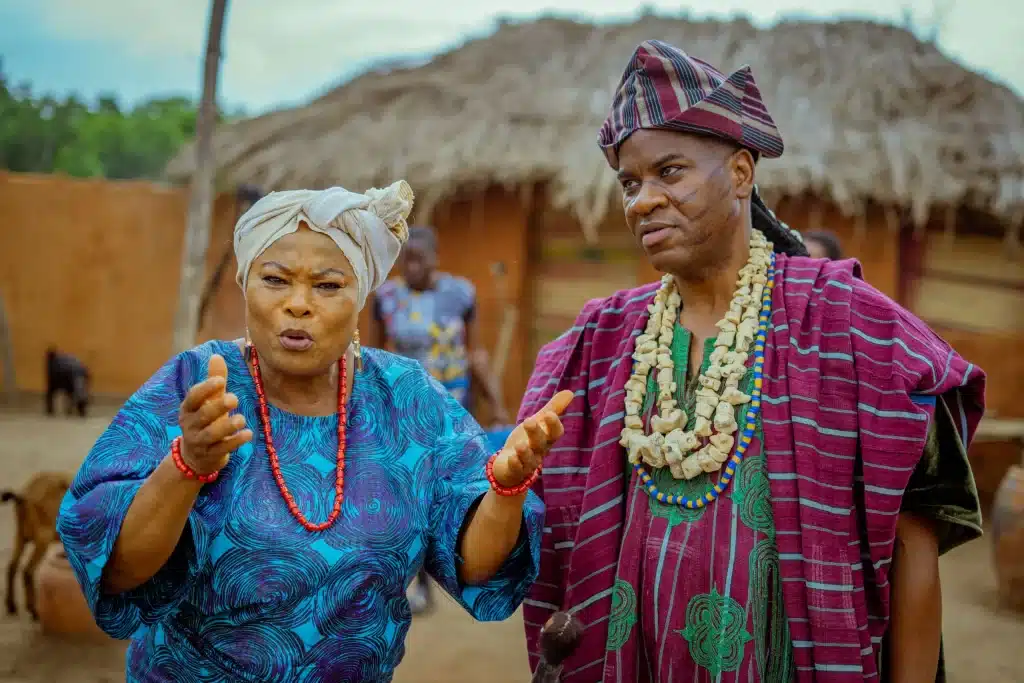
Owobo Ogunde Biography
Owobo Ogunde was born on May 5, 1978, in Ogun State, Nigeria. He is a renowned actor known for his portrayal of Baṣorun in the Netflix epic fantasy series “Anikulapo.” As the last son of the late theatre legend Hubert Ogunde, Owobo inherited a rich legacy of acting and storytelling, which he has passionately carried forward throughout his career. Owobo Ogunde is 46 years old as o 2024.
Owobo Ogunde Education
Owobo Ogunde pursued his passion for acting by studying theatre arts at the University of Lagos, where he honed his craft and gained valuable insights into the art of storytelling and performance. His academic journey provided him with a solid foundation upon which he built his illustrious career in the entertainment industry.
Owobo Ogunde Career
Owobo’s acting career began under the tutelage of his father, Hubert Ogunde, a pioneer of Nigerian theatre and contemporary Yoruba theatre. In the 1970s, Owobo made his debut on stage in his father’s play “Aropin N’Tenia,” where he portrayed the character of Oriadekigbe, showcasing his innate talent and dedication to the craft of acting.
Over the years, Owobo continued to refine his skills and expand his repertoire, earning acclaim for his versatile performances in both stage productions and film. His breakthrough role came with his portrayal of Baṣorun in the Netflix series “Anikulapo,” where he captivated audiences with his compelling portrayal of the complex and ambitious character.
Owobo Ogunde interview with BBC
In a BBC interview, Owobo revealed that his love for acting was inherited from his father, a revered figure in Nigerian and Yoruba theatre. He reminisced about his debut role as Oriadekigbe in his father’s play “Aropin N’Tenia” during the 1970s at Lagos’s Glover Hall. This historical drama, later adapted into a film in 1982, depicted the turbulent times of the Oyo Empire in the 19th century.

Reflecting on his upbringing, Owobo credited his father for instilling in him the art of storytelling, the significance of culture, and the virtues of diligence. He expressed pride in continuing his father’s legacy through involvement in “Aníkúlápó,” a cinematic ode to the rich tapestry of Yoruba culture and mythology.
Produced by Kunle Afolayan and distributed by Netflix, “Aníkúlápó” narrates Saro’s journey, a weaver bestowed with the ability to revive the dead after an encounter with a queen. Owobo portrays Baṣorun, a chief entangled in Saro’s fate, describing the character as intricate and ambitious. To convincingly embody Baṣorun, Owobo undertook thorough research and preparation.
Owobo lauded his co-stars, particularly Kunle Remi and Bimbo Ademoye, praising their on-screen chemistry and camaraderie. He also commended Afolayan for his creative vision and direction, crafting a film that venerates Yoruba heritage.
Expressing his aspirations for “Aníkúlápó,” Owobo hoped it would captivate, enlighten, and educate audiences about Yoruba history and culture. Grateful for the opportunity to contribute to such an innovative project, he eagerly anticipated future endeavors celebrating Nigeria’s diversity and splendor.
Owobo Ogunde Personal Life
Outside of his career, Owobo Ogunde enjoys a rich and rewarding personal life. Owobo Ogunde is happily married to Oluwakemi, and together, they experience the joys and challenges of parenthood, raising both a son and a daughter.
Despite his growing success in his career, Owobo stays true to his family-oriented values. He prioritizes maintaining a healthy balance between his professional endeavors and his personal relationships, recognizing the importance of both aspects of his life. Owobo’s commitment to his family brings him fulfillment and happiness, serving as a source of strength and support as he navigates his journey through life.
Who Is Hubert Ogunde? – Owobo Ogunde’s Father
Chief Hubert Adedeji Ogunde, born on July 10, 1916, and passed away on April 4, 1990, was a prominent Nigerian figure known for his multifaceted talents as an actor, playwright, theatre manager, and musician. Hailing from Ososa, near Ijebu-Ode, Ogun State, Nigeria, he was born to Jeremiah Deinbo and Eunice Owotusan Ogunde. His upbringing was influenced by both Christianity, through his Baptist pastor father, and African traditional religion, as his maternal grandfather was an Ifa priest. This diverse cultural background shaped his early years, fostering a deep appreciation for both Yoruba traditions and Western education.
Ogunde’s journey into the world of performance began during his school days, where he participated in the Egun Alarinjo performance group. After completing his education, he worked as a pupil-teacher at St. John’s School and served as a church choirmaster and organist. His path took a turn when he joined the Nigerian police force in 1941, stationed initially in Ibadan and later in Lagos. It was during his time in Lagos that he founded the African Music Research Party, a platform for amateur drama, in 1945.
Under the patronage of the Church of the Lord (Aladura), Ogunde co-produced his first folk opera, “The Garden of Eden and The Throne of God,” in 1944. This marked the beginning of his illustrious career in theatre, characterized by a fusion of traditional Yoruba themes with modern dramatic techniques. His subsequent works, including “Africa and God,” “Israel in Egypt,” and “Nebuchadnezzar’s Reign and Belshazzar’s Feast,” further solidified his reputation as a trailblazer in Nigerian theatre.
In 1946, Ogunde made the bold decision to resign from the police force and pursue a full-time career as a dramatist. Over the years, he evolved his theatre company, initially known as the Ogunde Theater Party, into a formidable institution that showcased more than 50 plays. His productions often addressed contemporary social and political issues, earning him both accolades and controversies.
Despite facing challenges, including a two-year ban on his theatre company in the Western Region of Nigeria, Ogunde remained undeterred in his pursuit of artistic expression. In the late 1970s, inspired by the burgeoning Nigerian film industry, he ventured into filmmaking, producing feature-length movies like “Aiye,” “Jaiyesimi,” and “Ayanmo.”
Ogunde’s legacy extends beyond the stage and screen; he was a pioneer who paved the way for future generations of Nigerian artists. His contributions to Nigerian theatre and cinema have left an indelible mark, earning him the title of “the father of Nigerian theatre” and “the father of contemporary Yoruba theatre.” Through his enduring works, Hubert Ogunde continues to be celebrated as a visionary who bridged tradition and modernity, leaving behind a rich cultural heritage for generations to come.
Hubert Ogunde, a celebrated Nigerian artist, was known for his prolific career as an actor, playwright, and musician. His personal life, too, was notable, as he married more than ten wives and had a large family. His theater company, the Ogunde Theater, was a family affair, with all his wives and children participating in various roles, including acting, drumming, singing, and ticket selling. This family involvement added a unique dimension to the theater’s productions, making it a truly collaborative effort.
One of his wives, Miss Clementina Oguntimirin, managed the Ogunde Theater and also acted under the name Adeshewa Clementina Ogunde or Mama Eko, a name inspired by one of the theater’s popular plays from the 1960s. Other wives included Ibisomi Ogunde, Risikat Ogunde, and Emily Kehinde Olukoga-Ogunde, all of whom contributed to the success of the theater in their own ways.
Despite his busy family life, Ogunde was a trailblazer in Nigerian cinema, producing acclaimed films such as “J’ayesinmi” and “Aiye.” However, his health declined during the filming of “Mr. Johnson,” and he passed away on April 4, 1990, at London’s Cromwell Hospital after a brief illness. His legacy lives on, with a portrait of him displayed in the National Gallery of Modern Art in Lagos. Owobo Ogunde is his last son out of his 17 children
In recognition of his contributions to the arts and culture of Nigeria, Ogunde was honored with a chieftaincy title, becoming an Oloye of the Yoruba people. Additionally, his daughter, Abosede Ogunde Oloyede, founded the Hubert Ogunde Memorial School in Akute in 1995 to commemorate his life and work, ensuring that his legacy continues to inspire future generations.
Owobo Ogunde Net Worth
Owobo Ogunde’s success in the entertainment industry has contributed to his estimated net worth of $200,000. Through his talent, hard work, and dedication, Owobo has carved out a niche for himself in the competitive world of acting, establishing himself as a respected figure in Nigerian cinema and beyond.
Other Facts About Owobo Ogunde
Owobo Ogunde, born on May 5, 1978, in Ogun State, Nigeria, is not just an actor but also a guardian of a rich legacy in Nigerian theatre. Being the youngest son of the esteemed Hubert Ogunde, Owobo was steeped in a world of narratives, tradition, and performance since childhood. His formative years, shaped by his father’s influence, set the stage for his foray into acting and entertainment.
Owobo Ogunde’s academic journey led him to the University of Lagos, where he delved deep into the intricacies of theatre arts. During his university tenure, he not only gained theoretical insights but also honed his acting prowess through hands-on experience, refining his skills under the tutelage of seasoned mentors. His educational background furnished him with a comprehensive grasp of dramatic principles, preparing him to navigate the complexities of the entertainment landscape.
Owobo’s illustrious acting career underscores his unwavering dedication, innate talent, and relentless pursuit of excellence. From his early days as a fledgling actor in his father’s productions, Owobo captivated audiences with his ability to infuse authenticity and emotional depth into his characters.
Over the years, Owobo’s journey in entertainment has been punctuated by notable accomplishments and memorable performances. His portrayal of Baṣorun in the Netflix series “Anikulapo” stands as a testament to his versatility and acting range. Through his nuanced portrayal of multifaceted characters, Owobo has earned widespread acclaim and admiration from peers and audiences alike.
While Owobo Ogunde’s professional pursuits often take center stage, his personal life remains a sanctuary shielded from the public eye. Despite the demands of his career, Owobo values precious moments spent with his loved ones, finding solace and joy in the embrace of family and close friends. His life experiences outside the limelight undoubtedly inform his artistic expression, infusing his performances with depth and authenticity.
Owobo Ogunde’s journey from the stages of Nigerian theatre to international acclaim has not only enriched his artistic legacy but also contributed to his financial success. With an estimated net worth of $200,000, Owobo’s achievements in the entertainment industry reflect both his artistic brilliance and entrepreneurial savvy. As he continues to enthrall audiences with his talent and passion, Owobo remains a formidable presence in Nigerian cinema, leaving an indelible mark on the African storytelling landscape.

Sage is a financial/consumer journalist and senior editor, personal finance, of TrendsHQ. EXPERTISE: Personal Finance, Careers, Jobs, Scholarships, and Entertainment.